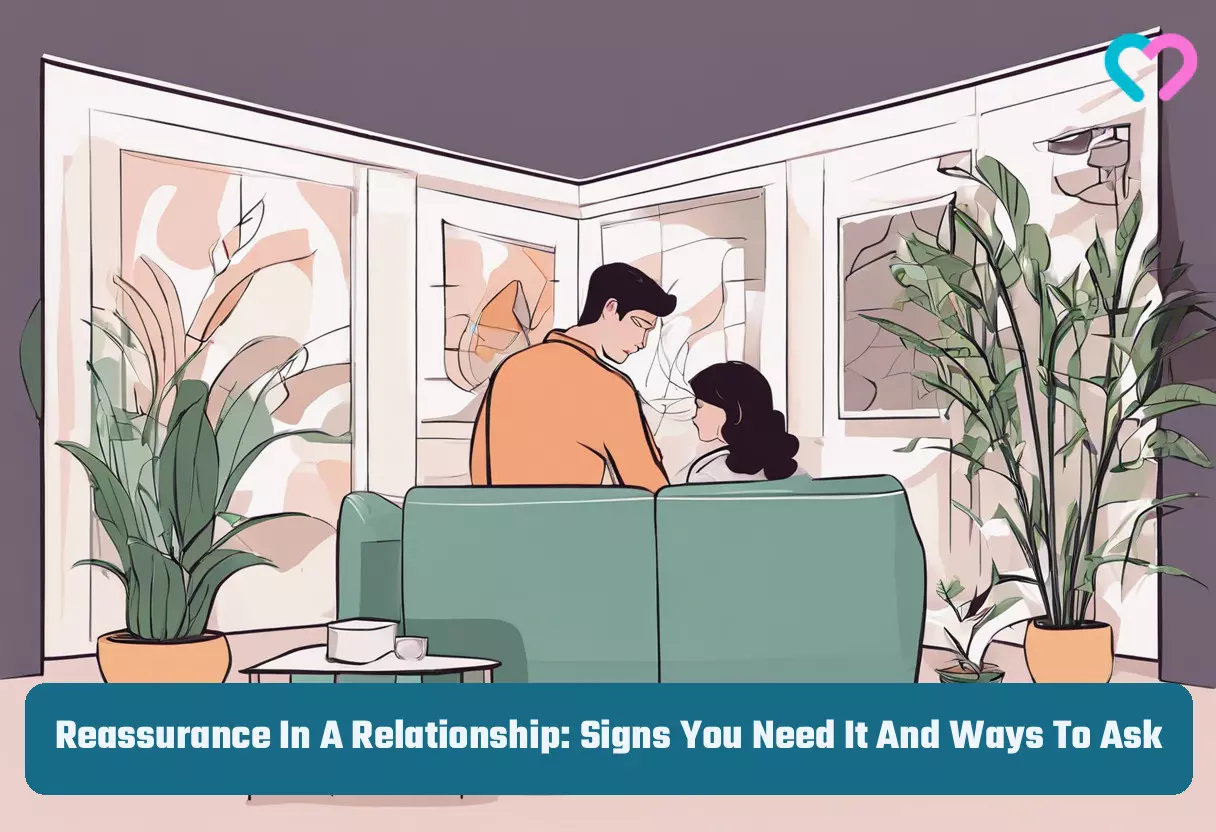
Image: Shutterstock
A relationship in today’s world means different things to different people. For some, it defines their persona, while some others are burdened by the fear of missing out on its nuances. This gives rise to the need for reassurance in a relationship, helping partners understand the depth of their commitment and avoid misunderstandings. Asking for comfort requires clear communication and trust between partners; giving reassurance warrants a clear understanding of each other’s needs. From hugs and affirmation to acceptance and flexibility, appropriate forms of love expressed in a relationship help reassure your partner that they are important to you. Continue reading this post to learn more about reassurance in a relationship, why you need it, the signs to look for, and the ways to ask for it.

Key Pointers
- Reassurance uses verbal and physical gestures to overcome insecurities in a relationship.
- Constant reassurance seeking may indicate improper expression of love in romantic relationships.
- Reassurance can be expressed through tokens of appreciation, kind words, support, and shared planning.
- Asking for reassurance requires clarifying expectations, planning, taking breaks, and seeking professional help.
What Is Reassurance In A Relationship?
Reassurance is the process of using verbal messages and being vulnerable with each other. It helps instill confidence in the relationship and is key to building trust, making your partner feel secure, and creating a secure bond. Irrespective of the type of relationship, both men and women have an innate need to express feelings and receive appreciation from one another. This is completely normal and an active part of reassurance in a relationship.
Couples in a relationship seek fortitude in the form of reassurance, compassion, and encouragement, especially when surrounded by anxiety and insecurities about their bond. By giving reassurance to your partner, you can express gratitude for their presence in your life and celebrate your devotion to each other.

 Research finds
Research findsWhy Do You Need Reassurance In Your Relationship?
Reassurance strengthens the foundation of your relationship and allows the partners to be vulnerable with each other. It also helps instill confidence in the relationship and increases affection and trust. A caring partnership can help prevent jealousy and ill-will towards other people in your social circle, thus, enhancing secure attachment between partners.
While seeking reassurance periodically is entirely normal and trust-enhancing, too much can be detrimental to you and your relationship. Constant reassurance seeking may occur due to improper expression of love and attachment avoidance behavior in interpersonal relationships.
Individuals with a history of insecure relationships and friendship conflicts tend to express anxiety and poor self-esteem when forming new bonds, which leads them to engage in reassurance-seeking behaviors. Studies also indicate that individuals with higher levels of attachment anxiety and depression symptoms tend to engage in excessive daily reassurance-seeking behaviors (3).

Examples Of Reassurance In A Relationship
Reassurance requires you to engage in behaviors expressing your love for your partner in body language and verbal communication. A study published in the Florida State University Libraries highlights that positive communication, including appreciation, is essential for relationship happiness. Research with newlywed couples found that those who maintained a 5:1 ratio of positive to negative interactions reported higher marital satisfaction (2). Thus, reassurance in relationships plays a similar role, fostering emotional security and strengthening bonds through consistent positive communication.
1. Tokens of affection
Spending quality time with each other and expressing generosity by giving tokens of appreciation such as flowers, handwritten messages, or arranging a movie night can go a long way in reassuring your partner of your intentions to keep them happy.
In this context, Shahtaj Khan, a wife and content writer, shares her experience of expressing her appreciation for her husband through a heartfelt handwritten message over digital messages. She writes in her blog, “In this digital era where everyone is creating TikTok or shooting videos, I decided to write an appreciation note for my husband. This means that I’m pouring my heart into words and trying to create a unique and meaningful appreciation note. I write down this heartfelt note for my husband to convey a unique way of love and also cherish how special he is to me.”
She further adds, “My heart is filled with joy, love, and respect for him as he deserves it all (i).”
Small acts of affection like these not only nurture reassurance but also build a stronger foundation of trust and connection in your relationship.
2. Kind words
Expressing kindness and forgiveness through open and nonjudgmental communication enhances intimacy and trust between partners. Words of appreciation, gratitude, and apologizing when wrong signify to your partner that you take their presence and boundaries seriously. According to psychologist William James, “The deepest principle in human nature is the craving to be appreciated (2).” Psychologists emphasize the benefits of gratitude, not just for individuals but for relationships, too. Harvard Health reveals that couples who regularly express gratitude feel more positive toward each other. Gratitude also boosts oxytocin, strengthening emotional bonds, which serves as a form of reassurance in a relationship, fostering trust and deeper connections (3).
3. Mutual respect
Expressing mutual respect, such as using kind and well-measured phrases and gestures during fights, can improve tolerance in the relationship. It also makes ironing out differences and resolving conflicts easier in the long term. John Gottman, an experienced and leading marital researcher, wrote in the journal Personal Relationships, “like most couples I’ve worked with over the years, [they] wanted just two things from their marriage- love and respect (4).”
4. Active interest
Boosting your partner’s morale by taking an active interest in personal achievements, dreams, and goals is an excellent way to show empathy and emphasize your love and affection for them.

5. Space
Showing patience and letting your partner have space to make errors and learn from mistakes helps boost their confidence and enhances their trust in you. This will allow them to approach you with their queries or problems and be more receptive to feedback.
6. Plan for future
A successful relationship necessitates your partner to be aware of your current standing on your future together and the efforts you have dedicated towards it. This promotes security in the relationship and eases attachment anxiety.
 Do remember
Do rememberSigns You Need Reassurance In A Relationship
From feeling insecure to anxious or depressed about your attachment to your partner, multiple signs indicate that you need reassurance and sympathy in your relationship.
1. An increasing number of ‘why’ questions
Partners who experience anxious attachment may wonder why they matter to you and raise questions that indicate confusion on whether they are good enough for you. The questions may be suggestive of a need for compliments or show an edgy attachment style.
2. Fear about future conflicts
An insecure partner may constantly fear that things will go wrong in the relationship. For instance, they may have apprehensions over having disagreements about finances, values, and personal goals, leading to feelings of uncertainty.
3. Self-doubt
A partner needing clarification on their relationship and loyalty tends to question their competency in achieving personal goals or making progress in the relationship stages. They tend to be hyper-aware of the changes within the relationship and may show signs of nervousness and suspicion.
According to a paper released by the Journal of Personality and Social Psychology, a study found that individuals with low self-esteem tend to doubt their partner’s regard when experiencing self-doubt, which negatively impacts their perception of the relationship. In contrast, those with high self-esteem feel more assured of their partner’s acceptance during moments of self-doubt (5). This highlights how self-doubt can be a sign that reassurance is needed in a relationship, especially for those struggling with low self-esteem.
4. Increased attachment avoidance
Avoidant partners may begin to look for ways to walk away from the relationship before it is “jeopardized.” Such partners may have judgmental expressions, argumentative quips, or cold body language during conversations about the future.

5. Social media activity
Partners who are unsure about the functionality of their relationship may often resort to an exaggerated social media presence. Their increased social media activity may oscillate between posting nostalgic and fresh memories of their dating and personal lives.
A study with 627 participants conducted by Spencer Palmer Christensen from Brigham Young University, found that excessive social media use negatively impacts emotional well-being and relationship quality, often leading to frustration, depression, and social comparison. As emotional health declines, relationships also suffer, with distractions and irritation being common consequences (6). This suggests that social media activity can be a sign of needing reassurance in a relationship, as it may stem from emotional insecurities and a desire for validation.
6. Excessive bragging
Partners who feel belittled in the relationship may exaggerate their achievements to both their partner and peers. They boast about their love life, openly complain about having you as a partner, or share private information to flaunt your relationship.
7. Fear of abandonment
It is a type of anxiety when someone has an irrational fear of losing someone. A person’s fear of abandonment may stem from insecurities or the loss of someone dear in the past. Everyone goes through such incidents at some point in their life, but those with abandonment issues live in constant fear. Noticeably, such people may also behave in a manner that compels people to leave so that the loss never comes as a surprise. They may have difficulty trusting others and committing to a relationship, and may even show self-harming tendencies. This may prompt a person to seek constant reassurance.
8. Difficulty communicating needs
If you struggle to communicate your needs or fears with your partner, it may signal a need for reassurance. Communication is essential, and this difficulty in expressing yourself could mean you’re seeking more support and validation in your relationship.
Ways To Ask For Reassurance In A Relationship
Whereas most individuals naturally indulge in giving reassurances to their partner in the initial phase, progressive reassurance can be challenging and requires conscious reflection on interpersonal needs. If you think you need reassurance from your partner, you may try these:
1. Have open communication
It is essential for couples to openly clarify each other’s boundaries, attachment styles, and expectations from the relationship. Trust in relationship can be built by erasing insecurities and resolving conflicts non-judgmentally.
In a research paper published by the Personality and Social Psychology Bulletin, it was seen that negative communication in relationships can lead to decreased satisfaction, while less negative communication is linked to greater relationship contentment. This suggests that open, honest communication helps couples feel more satisfied and connected (7). In the context of asking for reassurance, open communication allows partners to express their emotional needs and seek reassurance in a way that strengthens trust and mutual understanding.
2. Express your needs
Communicating your needs enables your partner to know about your expectations from them. In turn, it allows you to be emotionally available to your partner, spend quality time together, have mutual appreciation, and be privy to each other’s preferences.
3. Plan a layout of reassuring activities
Knowing when you or your partner need reassurance is an active part of seeking and giving it. A planned layout of reassuring activities (such as dates or tokens of appreciation) can be prepared by partners to face the circumstances when you each expect to be reassured.
 Quick tip
Quick tip4. Take scheduled breaks
The most crucial aspect of reassuring is taking breaks within the boundaries of your relationship. This can be done by scheduling days or hours for personal time, family gatherings, and outings with friends, both with and without your partner’s presence.
5. Practice personal reassurance
Self-reassurance is a vital component of reassurance in a relationship. This can be practiced through personal affirmations, gratitude journaling, splitting chores (especially those of child care) equally, and engaging in leisure activities (such as indulging in hobbies or visiting the spa).
6. Apologize
Saying sorry in an argument where you are wrong is desirable, but admitting the same takes you a step ahead in showing humility and a genuine desire to amend what’s wrong. This sends a positive signal to your partner and they understand your need for reassurance.
7. Seek professional support
If you feel overwhelmed in a relationship, you may require professional support to help resolve any underlying issues. In such circumstances, a relationship therapist can help you identify your needs with honesty and openness in communication and give you the reassurance to satisfy them. They can also recommend you relationship building activities that can strengthen your connection and improve communication.
Tips For Evaluating Reassurance In Your Relationship
Reassurance is vital in relationships, helping partners feel secure and valued. However, knowing when and how to seek reassurance can make a big difference in maintaining healthy dynamics. Here are practical tips for evaluating reassurance in your relationship.
- Observe communication patterns: Notice how often reassurance is sought and whether it’s consistent. Excessive reassurance may indicate insecurities, while a healthy balance helps foster trust.
- Reflect on trust levels: Evaluate if reassurance strengthens or undermines your trust in each other. Healthy reassurance should reinforce confidence, not create dependency.
- Check emotional reactions: Assess how reassurance makes you and your partner feel. Does it alleviate doubts or lead to frustration? Open communication is key to understanding these feelings.
- Examine attachment styles: Understand your and your partner’s attachment styles. Anxious or avoidant attachment styles can influence the need for reassurance, so recognizing these patterns helps you handle them effectively.
- Seek consistent support: Evaluate if reassurance is being offered consistently, especially during tough moments. A lack of reassurance during difficult times may indicate an imbalance in emotional support.
- Set boundaries: Ensure that reassurance is mutually agreed upon and not one-sided. Healthy relationships allow both partners to feel comfortable seeking reassurance without overburdening the other.
By regularly evaluating how reassurance affects your relationship, you can ensure it enhances trust and emotional support rather than fostering insecurity or dependence.

Frequently Asked Questions
1. Is needing constant reassurance a red flag?
Excessive reassurance-seeking may become a red flag in a relationship, especially when the partner carries emotional baggage from past trauma or has underlying psychological problems. However, professional support and a patient partner can help with such circumstances (8).
2. Does needing reassurance mean I’m insecure?
Seeking reassurance is a normal relationship behavior and may not necessarily label you as insecure. However, excessive reassurance-seeking behaviors combined with feelings of jealousy or vindictiveness towards your partner’s close friends can indicate insecurity.
3. Is reassurance a love language?
Reassurance in a relationship is a compilation of the various forms of love language, such as words of affirmation, quality time, acts of service, gifting, and physical touch, which form its foundation.
Seeking reassurance is a normal part of love and relationships, where partners need to communicate and clarify their feelings about each other and ensure the formation of a secure attachment. It can strengthen emotional intimacy and foster a healthier connection. Reassurance in a relationship includes all forms of love language, it requires identification and periodic exchange to provide respect and trust. Clarifying one’s expectations and making active plans can help partners get reassurance in the most appropriate ways. Understanding the most important thing in a relationship like genuine communication and mutual respect can help prevent dependence on external comforts and social media feedback, which often hinder the progression and quality of the relationship.
Infographic: Ways To Give Reassurance In A Relationship
Giving reassurances is equally important as asking for them and needs to be done on a regular basis to ensure a smooth relationship between partners. The following infographic highlights effective ways in which you can give reassurance to your partner.
Some thing wrong with infographic shortcode. please verify shortcode syntax
Illustration: Reassurance In A Relationship: Signs You Need It And Ways To Ask

Image: Stable Diffusion/MomJunction Design Team
Are you feeling insecure? Discover genuine ways to reassure your partner with understanding and love. Learn how to show your support during difficult times.
Personal Experience: Source
MomJunction articles include first-hand experiences to provide you with better insights through real-life narratives. Here are the sources of personal accounts referenced in this article.
i. An appreciation note for my husband: Thank you for being an amazing man https://medium.com/@shahtajkhan477/an-appreciation-note-for-my-husband-thank-you-for-being-an-amazing-man-62bfca7f064fReferences
- Andrew K. Gulledge et al.; (2006); Romantic Physical Affection Types and Relationship Satisfaction.
https://www.tandfonline.com/doi/abs/10.1080/01926180390201936 - Samantha A. Wagner et al.; (2025); Touch me just enough: The intersection of adult attachment intimate touch and marital satisfaction.
https://journals.sagepub.com/doi/10.1177/0265407520910791 - Lyndsay Elizabeth Evraire et al.; (2025); The Contribution of Attachment Styles and Reassurance Seeking to Trust in Romantic Couples; National Centre For Biotechnology Information
https://www.ncbi.nlm.nih.gov/pmc/articles/PMC8895702/ - How To Spot Relationship Red Flags; Cleveland Clinic
https://health.clevelandclinic.org/domestic-abuse-how-to-spot-relationship-red-flags
Community Experiences
Join the conversation and become a part of our nurturing community! Share your stories, experiences, and insights to connect with fellow parents.
Read full bio of Amira Martin
Read full bio of Siddharth Kesiraju
Read full bio of Shikha Thakur
Read full bio of Benidamika J Latam

















